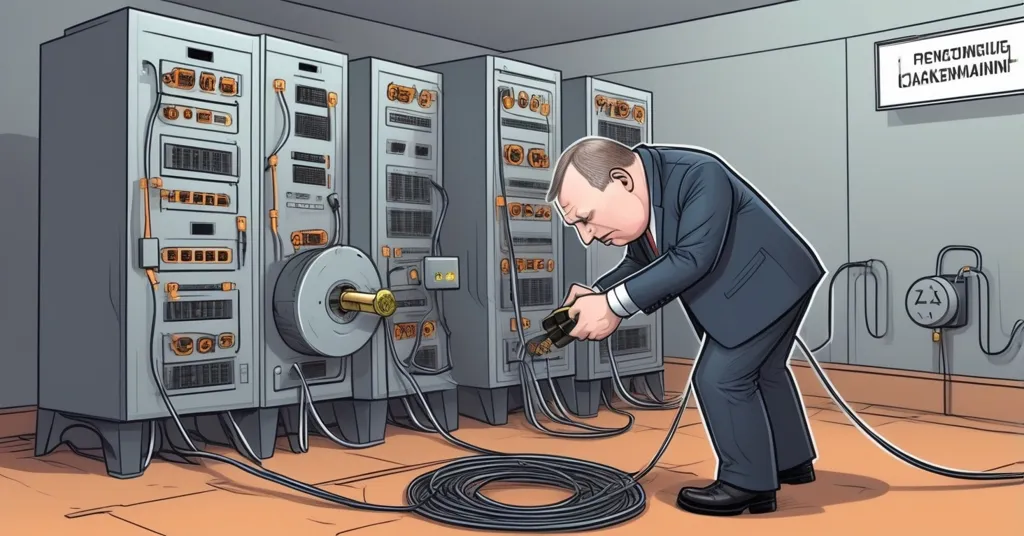Russia Expands Crypto Mining Bans: Energy Concerns Drive New Restrictions

Russia Tightens Crypto Mining Stranglehold: What’s Driving the Latest Bans?
Russia’s Ministry of Energy is set to extend crypto mining bans to three more regions amidst growing concerns over energy consumption and grid stability.
- New bans considered for Karelia, Penza Oblast, and parts of Khakassia
- Existing restrictions in Dagestan, Irkutsk, and Krasnoyarsk
- Energy Minister prioritizes domestic power supply
- Miners propose energy tariffs over outright bans
- Legal ambiguity persists around cryptocurrency use
- Russian Parliament debates new crypto regulations
The Russian Ministry of Energy’s latest proposal to extend crypto mining bans to Karelia, Penza Oblast, and parts of Khakassia reflects a deepening concern over the impact of mining on regional power grids. These regions, like the already restricted Dagestan, Irkutsk, and Krasnoyarsk, are struggling with the high energy demands of mining operations. In Karelia, for instance, the frequent blackouts and soaring power prices have been directly attributed to the energy-intensive activities of crypto miners. Imagine trying to run a small town on the power it takes to mine a few Bitcoins—it’s like trying to fill a swimming pool with a teaspoon!
Energy Minister Sergei Tsivilev has been vocal about the government’s priorities.
The ministry’s priority is to provide for domestic power supply, especially to less developed and far-flung areas.
His stance highlights a clear intent to safeguard the energy needs of local communities over the profits of crypto miners. It’s a classic case of “people over profits,” but in the world of crypto, that’s easier said than done.
Yet, the mining industry isn’t sitting idly by. Industrial miners argue that instead of outright bans, the government should consider imposing energy tariffs—special rates or fees for electricity used in mining—and increasing taxation. They warn that blanket prohibitions could have severe economic repercussions, impacting local tax revenues and employment markets.
Blanket prohibitions would negatively affect local tax revenues and employment markets.
This perspective suggests a potential middle ground, where miners could operate under stricter financial regulations rather than face complete shutdowns. It’s like miners are saying, “Hey, let’s not throw the baby out with the bathwater!”
The legal landscape surrounding cryptocurrencies in Russia adds another layer of complexity. While the government has legalized crypto mining as a business activity, the use of cryptocurrencies for payments remains illegal. This ambiguity creates a challenging environment for miners and regulators alike, as they navigate a gray area between legal and illegal activities. It’s like trying to play a game where the rules keep changing mid-play.
Amidst these tensions, the Russian Parliament is actively debating draft bills that could reshape the country’s crypto landscape. Proposals include officially recognizing crypto mining, establishing a state registry for mining firms, and imposing bans on cross-border crypto payments—transactions that occur between different countries. These legislative efforts could significantly alter Russia’s role in global crypto mining, potentially aligning it more closely with international standards or further isolating it due to sanctions. It’s a high-stakes game of chess, with every move impacting the future of crypto in Russia.
The global context of crypto mining adds another dimension to Russia’s approach. With abundant and affordable energy resources, Russia has become a hotspot for miners. However, the strain on power grids, particularly in remote areas, mirrors a worldwide challenge as countries grapple with the environmental and infrastructural impacts of mining. The geopolitical situation, including sanctions following Russia’s invasion of Ukraine, also plays a role, as cryptocurrencies could serve as a tool for circumventing these financial restrictions. It’s a delicate balance between embracing the future of finance and managing the immediate needs of the present.
The situation in Russia is a microcosm of the broader debate on the future of crypto mining. While the industry promises economic benefits, the environmental and infrastructural costs cannot be ignored. As Russia navigates this complex terrain, the world watches closely, aware that the decisions made here could set precedents for other nations facing similar dilemmas. And let’s not forget, in the grand scheme of things, this is all about the unstoppable force of decentralization. Bitcoin maximalists might scoff at the idea of government interventions, but even they must acknowledge the intricate dance between innovation and regulation. As for the altcoins? Well, they’re just along for the ride, filling niches where Bitcoin might not tread, but all contributing to the grand tapestry of this financial revolution.
But let’s keep it real: not all is rosy in the world of crypto. The dark side of mining, including its environmental impact and the potential for scams, cannot be overlooked. As advocates for decentralization and privacy, we must remain vigilant and critical, ensuring that the push for progress doesn’t blind us to the real-world consequences.
Key Takeaways and Questions
- Why is Russia considering expanding crypto mining bans?
Russia is considering expanding crypto mining bans due to growing concerns over energy consumption and the strain on regional power grids, particularly in remote and less developed areas.
- What regions are currently affected by these bans?
The regions currently affected by crypto mining bans include Dagestan, Irkutsk, and Krasnoyarsk.
- What alternative solution do industrial miners propose?
Industrial miners propose implementing energy tariffs and increasing taxation on mining activities instead of imposing blanket bans.
- How does the legal status of cryptocurrency in Russia contribute to the situation?
The legal status of cryptocurrency in Russia is ambiguous; while mining is legalized as a business activity, the acceptance of crypto for payment is not, leading to uncertainty and complicating enforcement and policymaking.
- What potential regulatory changes are being discussed in the Russian Parliament?
The Russian Parliament is debating draft bills that could officially recognize crypto mining, create a state registry for mining firms, and impose bans on cross-border crypto payments to avoid sanctions issues.



